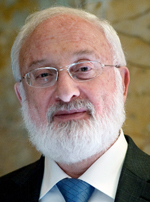
PETACH TIKVAH, Israel — All over the world, people are moving out from the coronavirus-struck city centers into the suburbs and beyond, to the country or even to different countries. Within a few months from the outbreak of the pandemic, people have gotten used to working from home, making the necessity to live close to the office redundant. As a result, thousands of apartments in the once high-end neighborhoods in big cities around the world are standing vacant.
The shift is more than temporary. People will have no reason to return, other than for possible recreational activities, but even these will probably die out in the big cities. The shift we are witnessing the world over is nothing short of a transformation of human civilization.
It is not just work, but everything is becoming virtual. Banks and financial services, government offices, software and high-tech companies, and most other products and services are moving to the online arena. And where physical presence is required, drone deliveries will replace much of today’s necessary rides.
But people will not be happier. On the contrary, the ill-feelings spreading across America and around the world will only spread further and deeper into people’s hearts. COVID-19 has exposed our mistreatment of each other, our disregard, callousness, and venom that we harbor toward anyone we disagree with. Those who will hide in their country homes will stay there for fear of the violence in cities and on the roads, and will feel very isolated and alone. Those who will stay in the cities will be afraid to step out of their homes even to get groceries.
In that situation, people will have no choice but to start looking for real answers to their problems. When they do, they will realize that those who have been telling them that their misery is caused by the president (whomever he may be in two months), or a certain party, or a particular policy, or some injustice, may have been correct, but missed the root cause. And without finding the root, cutting off the shoots does nothing to ease the pain.
As people examine their situation, they will realize that there is one common root to all their plights: broken human relations. They will see that our troubles all stem from our shattered relations with each other. We have turned our society into a battlefield of clashing sects divided by race, affluence, religion, political affiliation and generally anything that can set people apart and pit them against each other.
Our misery does not stem from a certain leader, party or any other authority. It stems from the fact that I don’t like and I can’t trust my neighbor. In many cases, we feel estranged even from our own families. When this is the situation, it makes no difference who is in power; we will always feel miserable. Conversely, if we have a great, tight-knit family, and great neighbors that we like and can trust, we won’t really mind who is in power and what they do; we will feel safe and happy in our communities and families.
When people protest against injustices, they vent their frustration and anger. Their causes might often be noble and worthy, but the anger they express in their protests does not stem from their indignation at the injustice inflicted by the authorities; it mainly expresses their disconnection from society. Otherwise, they would not be able to torch other people’s businesses and homes, shattering their livelihoods and beating them up to protest injustice.
The social breakdown is happening all over the western world and beyond. In America, however, it is the most conspicuous, for now. If America can cope with it, so will other countries. If America doesn’t, others will have a much harder time succeeding.
The emptying cities of America are a red alert, a call to establish solidarity, care, and mutual responsibility in society. There will always be different opinions in society because the nature of human beings is to have their own opinions. The question is not how we make everyone see that we are right, but how to make everyone feel like one family again, or at least, like one neighborhood, where a good neighborhood is good for everyone!
*
Michael Laitman, Ph.D., studied philosophy and Kabbalah at the Russian Academy of Sciences in Moscow, and now resides in Petach Tikvah, Israel. He has published more than 40 books on a variety of topics.